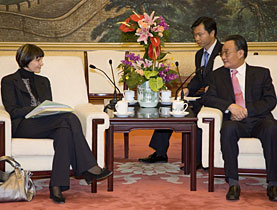Swiss build a high-tech bridge to China

The opening of Swissnex's newest outpost in Shanghai has boosted ties between Switzerland and one of the world's largest science and technology centres.
Swissnex Shanghai – the first centre in China and fourth in the world – officially opened this week, establishing a strong foothold in the burgeoning research and development sector in the world’s most populous country.
China, the giant empire built on low wages and massive manufacturing capacity, is now in the fast lane and on its way to becoming a knowledge society.
Every year, millions of highly qualified professionals enter the labour market, and an increasing number of Swiss firms and universities are profiting from this massive talent pool.
With its presence in one of China’s largest cities, Swissnex, a public-private partnership sponsored in part by the interior ministry and foreign ministry and billed as one of Switzerland’s platforms for innovation and bilateral cooperation, has marked its territory.
“Our aim is to develop a network to promote scientific exchange between Switzerland China,” State Secretary for Education and Research Mauro Dell’Ambrogio told an audience of politicians, business leaders and educators.
Exchange
The programme at the new centre includes an exchange of professors and doctoral students, as well as the promotion of Switzerland as a centre for innovation, he said.
“Swissnex will also liaise with the Chinese authorities, with Switzerland and with Swiss industry in China,” Dell’Ambrogio told swissinfo.
A former head of police for the Italian-speaking canton Ticino, Dell’Ambrogio says there will be no competition between the new office and the scientific attaché at the Swiss embassy in Beijing. Swissnex is highly flexible, he says, highly entrepreneurial and able to make decisions quickly.
In 2006, China invested the equivalent of SFr136 billion ($128 billion) on research and development; high-tech powerhouse Japan spent the equivalent of SFr130 billion. “I am convinced that China will soon close the gap between it and the United States, the frontrunner, which invests around 330 billion annually in research and development,” Dell’Ambrogio said.
By 2010, China is set to sink around two per cent of its gross domestic product into research.
In comparison, Switzerland currently invests three per cent, or a little over SFr750 million annually.
Apart from China itself, another early Swissnex partner in Shanghai will be the Federal Institute of Technology in Zurich. The university is also interested in seeing expanded cooperation with its Chinese counterparts.
“The top universities in China are already among the best in the world,” said Gerhard Schmitt, the university’s vice-president. “Already today, around five per cent of our students come from China and research in China is becoming increasingly popular. It is a sharply-rising trend,” he said.
Partnership
“For us, it is important to have a partner on the ground with Swissnex,” he added. In the long run, Schmitt expects a revival of the alumni scene with the presence of more Sino-Swiss companies.
Mao Jianwen, head of research and development in China for Basel-based chemical giant Ciba, sees the centre as an ambassador and an opinion leader among Chinese authorities and universities. “We are pleased to provide our resources for research projects,” he said. At the moment, however, most of the focus is on networking; there are no concrete projects yet.
Switzerland’s outpost in Shanghai has been operational for months already, meaning there will be no cold start for the team, which is lead by Dr Flavia Schlegel, a former diplomat in Washington.
For the period between 2008 and 2011, the centre in Shanghai will receive around SFr9 million in federal funding. Additional revenue will come from project partners in industry and academia.
Along with to Boston, San Fransisco and Singapore, Shanghai is the fourth Swissnex branch. Next year, the Indian high-tech centre of Bangalore will be added. There have also been discussions about adding sites in Moscow and Cape Town but Dell’Ambrogio stresses that no decision has yet been made.
swissinfo, based on an article in German by Fabian Gull
Science and technology research is an important component of Swiss foreign policy.
The purpose of Swissnex’s Houses of Science is to raise awareness of Switzerland as an internationally competitive location for scientific research and technological development, as well as promote worldwide cooperation in research and development.
The State Secretariat for Education and Research has created a professional network of science counsellors and science consulates in close cooperation with the foreign ministry.
The establishment and upkeep of the centres are funded from public and private sources.
The first Swissnex, originally known as Swiss House, opened in Boston in 2000.
The Swissnex in San Francisco began operating in 2003 followed by Singapore in 2004.
Swissnex in Bangalore will open in 2009.

In compliance with the JTI standards
More: SWI swissinfo.ch certified by the Journalism Trust Initiative











You can find an overview of ongoing debates with our journalists here . Please join us!
If you want to start a conversation about a topic raised in this article or want to report factual errors, email us at english@swissinfo.ch.